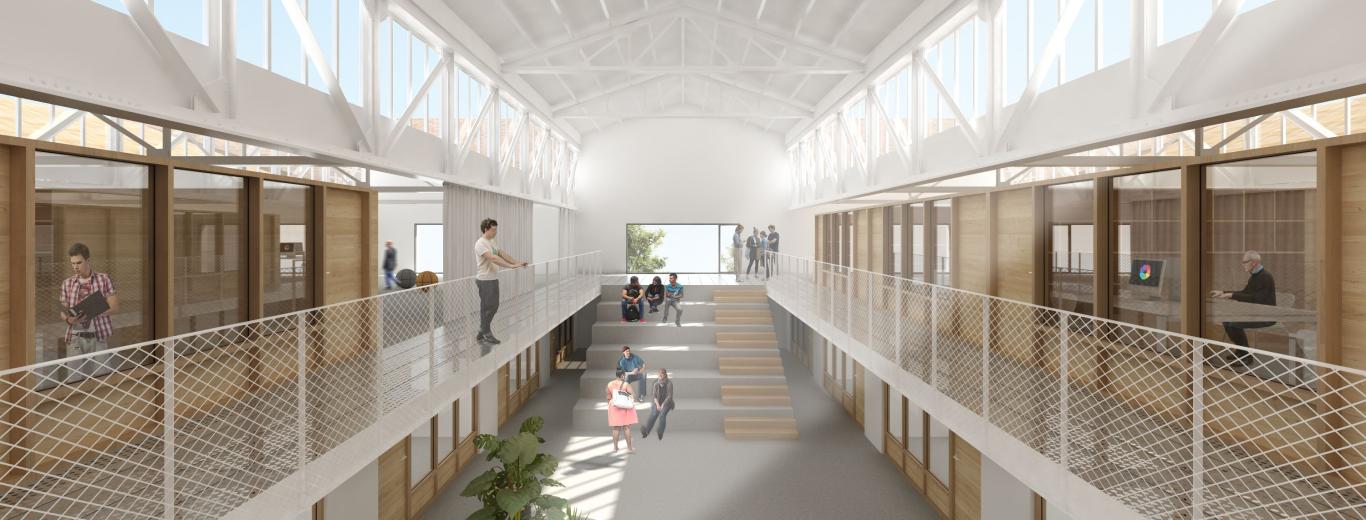Bloc4BCN - Espai Cooperatiu

Objectius del projecte
El projecte treballa per la promoció del cooperativisme i la incubació i acceleració de cooperatives i projectes d’economia social i solidària (ESS).
El nou espai acollirà més de 60 projectes dels sectors estratègics per enfortir el teixit empresarial de l’ESS, impulsar l’emprenedoria, l’enxarxament i l’acceleració de projectes. Així, es prioritzaran projectes en els àmbits de l’alimentació sostenible i agroecologia, atenció i cura de les persones, comerç de proximitat, cultura, energia, habitatge, mobilitat, tecnologia i digital, turisme i tèxtil. Aquests projectes rebran acompanyament i assessorament en gestió econòmica i financera i es donarà suport a la digitalització i els projectes tecnològics.
Descripció del projecte
El Bloc4bcn suposarà un dels majors pols del cooperativisme d’Europa. Actualment, l’ESS i el cooperativisme suposen el 7% del PIB de Barcelona mentre que, a escala de tota Catalunya, suposa el 2,2% del PIB. El BLOC4BCN suposarà una nova empenta a aquestes altres maneres de fer economia i que posen la vida al centre, que mostren una major resiliència en temps de crisi i que permeten un creixement de la ciutat sostenible social i mediambientalment.
El desenvolupament del BLOC4BCN forma part de l’Estratègia de Ciutat ESSBCN2030. L’Estratègia és fruit d’un procés participatiu liderat per l’Associació de l’Economia Social de Catalunya (AESCAT) i l’Ajuntament de Barcelona, i estableix un full de ruta amb unes prioritats consensuades d’aquí al 2030. Per tal d’assolir aquests objectius i assegurar l’expansió de l’ESS a Barcelona, l’Estratègia #ESSBCN2030 també identifica 10 projectes de ciutat. Aquestes palanques han de permetre impulsar de forma significativa, coordinada i prioritzada les línies estratègiques. Un dels projectes de ciutat és, precisament, l’activació d’aquest nou pol cooperatiu, un dels majors a Europa.
A més, per garantir els valors propis del cooperativisme i de l’ESS, el BLOC4BCN serà un equipament obert a la ciutadania. S’oferirà atenció individual, acompanyament en la gestió econòmica i financera d’iniciatives i suport en el finançament de projectes i en la digitalització. A més, es promourà el relleu generacional en entitats i empreses d’economia social i solidària. Així mateix, s’estudiaran oportunitats per impulsar projectes en diferents barris i districtes i crear hubs sectorials.
La governança de la nova incubadora també serà innovadora en si mateixa. Així, la gestió estarà en mans de l’àmbit cooperatiu i d’ESS de Barcelona a través de la gestió públic-cooperatiu. Després de mesos de treball entre l’Ajuntament de Barcelona i les entitats per definir el model de gestió, s’ha creat de l’Associació Bloc4 formada per la Confederació de Cooperatives de Catalunya, la Federació de Cooperatives de Treball i l’Associació Coòpolis.





